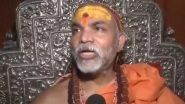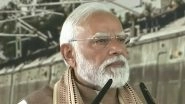New York, Oct 23 (AP) A US appeals court on Tuesday upheld the conviction and life prison sentence given to a London imam for supporting terrorism.
The 2nd US Circuit Court of Appeals said there was overwhelming evidence against Mustafa Kamel Mustafa, 60.
The court also ruled that Mustafa's 2012 extradition to the U.S. from England didn't come with conditions preventing his incarceration at the Supermax prison in Florence, Colorado.
Mustafa is missing both hands. His lawyers said he belongs at a prison better suited to people with disabilities.
A lawyer for Mustafa did not respond to a request for comment Tuesday.
Mustafa was convicted in 2014 of ensuring there were satellite communications for kidnappers during a 1998 attack that killed four tourists in Yemen, of supporting plans to open an al-Qaida training camp in Bly, Oregon, and sending someone to an Afghanistan training camp.
In the 1990s, he led London's Finsbury Park Mosque, reportedly attended by Sept. 11 conspirator Zacarias Moussaoui and shoe bomber Richard Reid.
Mustafa denied meeting them. At trial, he was referred to by his alias, Abu Hamza al-Masri.
The 2nd Circuit said it found no reason to reject rulings made by the trial judge regarding evidence offered by prosecutors.
"First, audio and video recordings of Mustafa encouraging religious violence, justifying the kidnapping and enslavement of non-Muslims, praising Osama bin Laden, and applauding murderous al-Qaida attacks in and outside the United States were probative of Mustafa's culpable intent in engaging in the charged crimes," the three-judge appeals panel wrote.
"Second, evidence of terrorist literature and military equipment seized from Mustafa's London residence and the Finsbury Park Mosque that he led was also probative of Mustafa's intent to support terrorism and to do so through violence," they added.
The judges rejected Mustafa's argument that he should have been permitted to testify that years of solitary confinement explained his poor memory and difficulty at expressing himself from the witness stand.
They noted that the trial judge let him testify that he had not spoken to more than one person at a time during over a decade of confinement and that his imprisonment had negatively affected his memory.
The 2nd Circuit also was not particularly critical of the fact that jurors were told about his earlier convictions in England for soliciting murder.
During oral arguments this year, two appeals judges were critical of the fact.
But, in the ruling, the panel noted that the government was trying to impeach Mustafa's claims that he was a peacemaker rather than a terrorist. (AP) MRJ
(The above story is verified and authored by Press Trust of India (PTI) staff. PTI, India’s premier news agency, employs more than 400 journalists and 500 stringers to cover almost every district and small town in India.. The views appearing in the above post do not reflect the opinions of LatestLY)













 Quickly
Quickly


